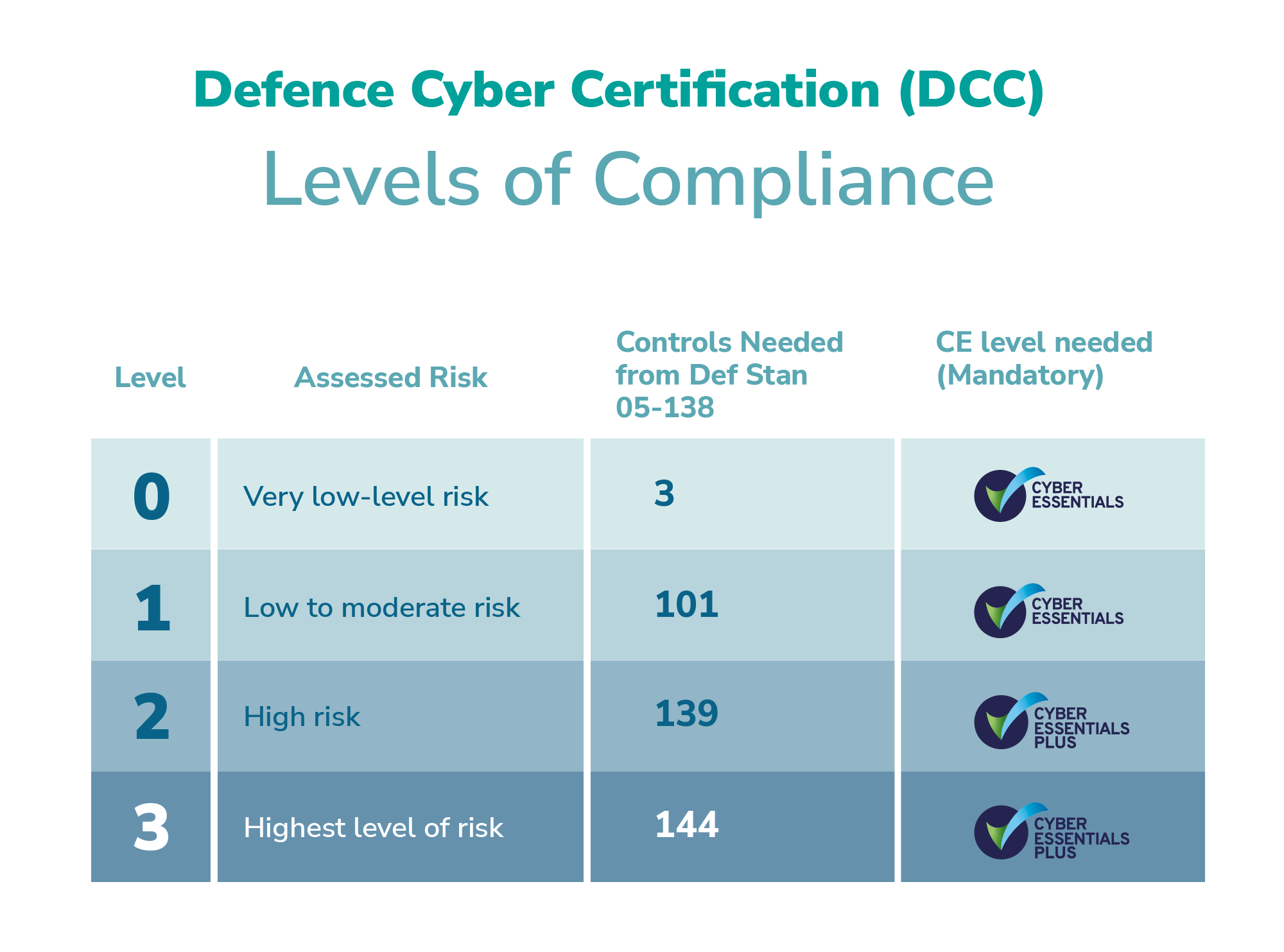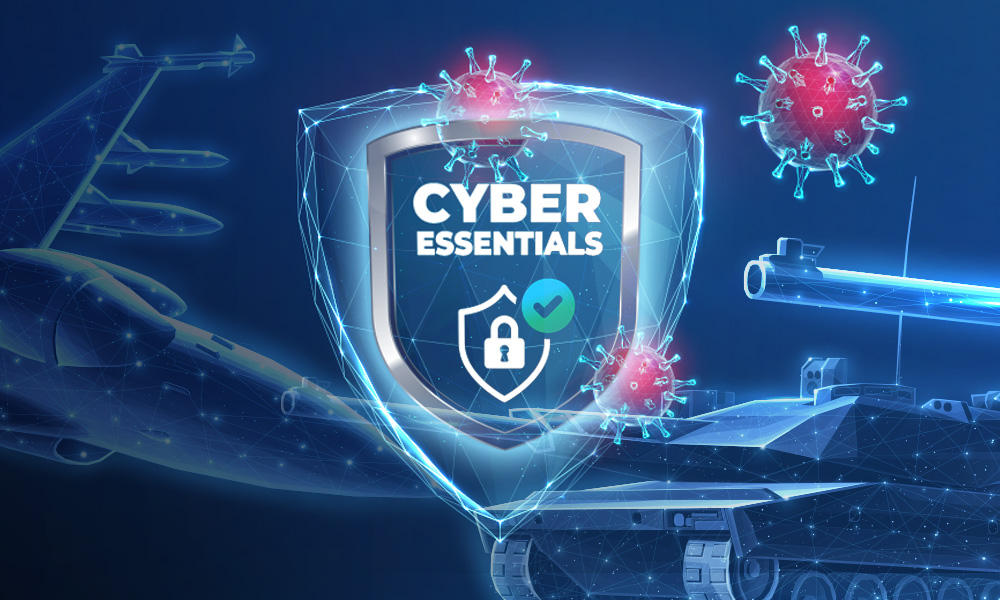In this blog, we explore the Ministry of Defence’s (MoD’s) Defence Cyber Certification (DCC), a voluntary, four-tiered cyber security scheme designed to help strengthen the resilience of the UK defence supply chain. We explain DCC’s four compliance tiers, how they expand on Cyber Essentials or Cyber Essentials Plus, the steps in the certification process, and the advantages of becoming certified.
The UK Government has an ongoing initiative to strengthen the resilience of the UK defence supply chain, which was emphasised in the Ministry of Defence’s (MoD’s) 2025 Strategic Defence Review. As part of this initiative, the MoD has introduced DCC, a voluntary cyber security certification scheme for UK defence suppliers.
What is it?
Developed by the MoD and IASME, and aligned with international leading practices, the aim of DCC is to provide independent, verifiable assurance based on pre-defined levels of compliance. The scheme defines four different compliance levels, which correspond to the identified risk of the supplier. As part of certification, Cyber Essentials or Cyber Essentials Plus (depending on compliance level) needs to be achieved, and a specific set of controls from the MoD Standard (Def Stan 05-138) need to be implemented. The controls an organisation must implement depend on its compliance level. Certification for DCC lasts three years, subject to annual check-ins.
How does it work?
As mentioned earlier, the scheme has four levels of compliance. These are:
Level 0
The most basic level, for organisations with very low risk assessed cyber risk. It requires compliance with three basic controls, in addition to Cyber Essentials.
Level 1
Aimed at organisations with low to moderate assessed cyber risk. It requires compliance with 101 basic controls, in addition to Cyber Essentials.
Level 2
Aimed at organisations with a high assessed cyber risk. It requires compliance with 139 controls, in addition to Cyber Essentials Plus.
Level 3
Aimed at organisations with the highest level of assessed cyber risk. It requires compliance with 144 controls, in addition to Cyber Essentials Plus.

What steps do organisations need to take to achieve DCC?
One of the first steps is to identify what level of compliance you need to achieve, or would be looking to achieve. Based on this, you can then decide whether to certify against (if you are not already certified) Cyber Essentials or Cyber Essentials Plus. It may be that previous MoD contracts held by your organisation identify its level.
Unlike Cyber Essentials, where you can exclude parts of your organisation from your certification scope, DCC requires you to certify all parts of your organisation that are essential to its operation, ideally your entire organisation. As such, policies, procedures and controls must be applied across your organisation as a whole, not just parts of it.
Once your organisation has determined the level required, and the relevant Cyber Essentials certification has been achieved, you can then begin to assess your current cyber security posture, identify any gaps and subsequently align your controls to the latest version of the Def Stan 05-138.
Once you are satisfied that your organisation meets the necessary control requirements, the certification process for all four levels is as follows:
- Contact IASME and obtain a list of authorised certification bodies
- Select a certification body from the list to conduct your assessment
- The selected certification body will outline the process and provide costs
- Once a contract has been signed, the assessment will begin
- The assessor will identify gaps and provide advice, but will not implement solutions
- You will receive certification or a report of failure (confidential)
What benefits are there to certifying?
One of the most significant benefits of achieving DCC is that it opens the door to MoD contracts not available to uncertified competitors, with many MoD tenders requiring DCC at a certain level. Without it, bids may not even be considered. Even for contracts that do not explicitly require certification to the scheme, DCC may provide you with a competitive edge over organisations that do not hold certification, as it can act as an independent and verifiable differentiator.
In addition, DCC expands upon Cyber Essentials and Cyber Essentials Plus certification, and further enhances your security posture. Depending on the level of compliance, the measures required for DCC include detection facilities, supplier management, incident handling and business continuity risk assessments. The controls outlined within Def Stan 05-138 are also closely aligned with those found in other established cyber security frameworks, such as ISO 27001 and the National Institute of Standards and Technology Cyber Security Framework (NIST CSF) 2.0. This reduces duplication of effort when achieving further certifications, allowing your organisation to build on existing practices, rather than from the ground up.
How can URM help?
Whilst DCC is a new framework, URM can leverage its 20 years’ of experience helping organisations implement security frameworks that have considerable overlap with the scheme (such as the NIST CSF 2.0 and ISO 27001) to support your DCC compliance.
As an accredited Certification Body for Cyber Essentials and a National Cyber Security Centre (NCSC) Assured Cyber Advisor, URM has supported and facilitated hundreds of organisations’ certification to the scheme. As such, we can offer a range of Cyber Essentials support services to help you prepare for a successful assessment and meet the necessary prerequisites for certification under the DCC scheme. For example, with our Cyber Essentials Application Review Service, you can be assured that you have understood and compliantly answered the self-assessment questionnaire (SAQ). Meanwhile, our Cyber Essentials Plus Pre-Assessment Service, which involves us performing a technical pre-assessment on a smaller set of systems, significantly increases your chances of success during the formal technical audit.
In addition to supporting your Cyber Essentials assessment, URM can also offer DCC-specific consultancy to help you achieve compliance with the scheme. We can conduct a gap analysis of your existing cyber security programme to identify where you are already meeting DCC requirements and where improvements are needed. Following the gap analysis, our team can provide hands-on support with remediating any gaps they’ve identified, and help develop, implement, and improve the effectiveness of the controls necessary to achieve DCC compliance.
URM is pleased to provide a FREE 30 minute consultation on penetration testing for any UK-based organisation.
If you are unsure, URM can perform CREST-accredited internal and external penetration testing against all IP addresses associated with your organisation, location, or service.
Designed to assess the architecture, design and configuration of web applications, our web application pen tests use industry standard methodologies to identify vulnerabilities.

URM’s blog shares a Managing Director’s account of navigating & recovering from a major cyber attack, with a focus on the human impact of the breach.

URM’s blog breaks down the new EU Cyber Resilience Act, what products/entities are in scope, the security requirements it imposes on organisations, and more.

URM’s blog explains what DCC is, how compliance with the scheme and the process to certification work, and the benefits to obtaining certification.



